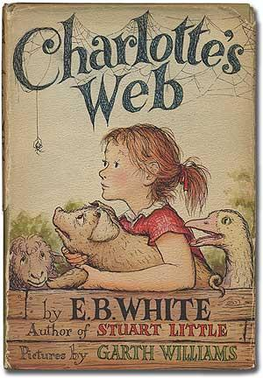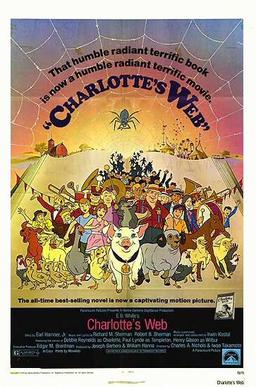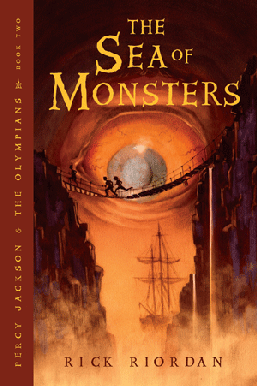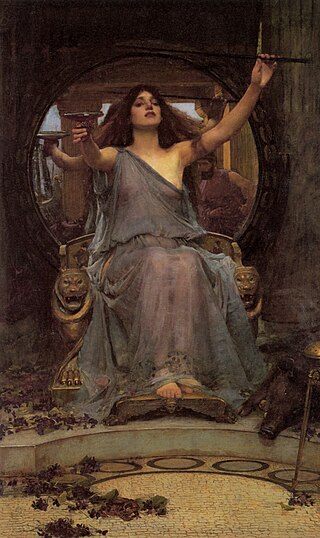
Nestlé S.A. is a Swiss multinational food and drink processing conglomerate corporation headquartered in Vevey, Vaud, Switzerland. It has been the largest publicly held food company in the world, measured by revenue and other metrics, since 2014. It ranked No. 64 on the Fortune Global 500 in 2017 and No. 33 in the 2016 edition of the Forbes Global 2000 list of the largest public companies.

Charlotte's Web is a book of children's literature by American author E. B. White and illustrated by Garth Williams; it was published on October 15, 1952, by Harper & Brothers. The novel tells the story of a livestock pig named Wilbur and his friendship with a barn spider named Charlotte. When Wilbur is in danger of being slaughtered by the farmer, Charlotte writes messages in her web praising Wilbur, such as "Some Pig" and "Humble", to persuade the farmer to let him live.
A boycott was launched in the United States on July 4, 1977, against the Swiss-based multinational food and drink processing corporation Nestlé. The boycott expanded into Europe in the early 1980s and was prompted by concerns about Nestlé's "aggressive marketing" of infant formulas, particularly in underdeveloped countries. The boycott has been cancelled and renewed because of the business practices of Nestlé and other substitute manufacturers monitored by the International Baby Food Action Network (IBFAN). Organizers of the boycott as well as public health researchers and experts consider breast milk to be the best nutrition source for infants. The World Health Organization (WHO) recommends infants to be exclusively breastfed for the first six months of their lives, nevertheless, sometimes nutritional gaps need to be filled if breastfeeding is unsuitable, not possible, or inadequate.
In Irish mythology Tír na nÓg or Tír na hÓige is one of the names for the Celtic Otherworld, or perhaps for a part of it. Tír na nÓg is best known from the tale of Oisín and Niamh.

The Sheep-Pig, or Babe, the Gallant Pig in the US, is a children's novel by Dick King-Smith, first published by Gollancz in 1983 with illustrations by Mary Rayner. Set in rural England, where King-Smith spent twenty years as a farmer, it features a lone pig on a sheep farm. It was adapted as the 1995 film Babe, which was a great international success. King-Smith won the 1984 Guardian Children's Fiction Award, a once-in-a-lifetime book award judged by a panel of British children's writers.

Charlotte's Web is a 1973 American animated musical drama film based on the 1952 children's book of the same name by E. B. White. The film was produced by Hanna-Barbera Productions and distributed by Paramount Pictures. Like the book, this film centers on a pig named Wilbur who befriends an intelligent spider named Charlotte who saves him from being slaughtered.

John Kramer is a fictional character and the main antagonist of the Saw franchise. Jigsaw made his debut in the first film of the series, Saw, and appears in all subsequent sequels, with the exception of Spiral, in which he is only mentioned and featured in photographs. He is portrayed by American actor Tobin Bell.

Voyage of Slaves is the third and final novel in Brian Jacques' Castaways of the Flying Dutchman series. It was released on September 13, 2006 in the UK and September 14, 2006 in the US. The cover art was illustrated by Michael Koelsch, who had previously illustrated the cover art of the first novel in the series.

Christos Theofilou, better known as "The Golden Greek" Jim Londos, was a Greek American professional wrestler. Londos was one of the most popular stars on the professional wrestling circuit in the 1930s and 1940s.

Wonder Pets! is an American educational animated preschool children's television series produced by Little Airplane Productions. The series follows a trio of classroom pets—Linny the Guinea Pig, Turtle Tuck, and Ming-Ming Duckling—who use teamwork to help animals in need. Most of the characters' dialogue is sung in the style of operetta. Each episode is set to original music by a 10-member live orchestra.
"ManBearPig" is the sixth episode in the tenth season of the American animated television series South Park. The 145th episode of the series overall, it first aired on Comedy Central in the United States on April 26, 2006. In the episode, Al Gore visits South Park to warn everyone about a creature called ManBearPig, an allegory for global warming. Gore then gets Stan, Kyle, Cartman, and Kenny trapped inside the Cave of the Winds.

The Sea of Monsters is an American fantasy-adventure novel based on Greek mythology written by Rick Riordan and published in 2006. It is the second novel in the Percy Jackson & the Olympians series and the sequel to The Lightning Thief. This book chronicles the adventures of thirteen-year-old demigod Percy Jackson as he and his friends rescue his satyr friend Grover from the Cyclops Polyphemus and save Camp Half-Blood from a Titan's attack by bringing the Golden Fleece to cure Thalia's poisoned pine tree.
Paul Shipton is an English children's author.
"Evolution of the Daleks" is the fifth episode of the third series of the revived British science fiction television series Doctor Who. It was first broadcast on BBC One on 28 April 2007, and is the conclusion of the two-part story begun in "Daleks in Manhattan" on 21 April.

Circe Offering the Cup to Ulysses is an oil painting in the Pre-Raphaelite style by John William Waterhouse that was created in 1891.

The Pig Scrolls (2004), by Paul Shipton, is a young adult comedy adventure novel about a talking pig (Gryllus) and his endeavours to save the world. The novel is set in Ancient Greece with many, often comical, references to ancient Greek mythology and life. The characters include all the major Ancient Greek gods, some minor deities, the young Homer and Sibyl, a prophetess in training at the temple of Apollo in Delphi.

Blart: The Boy Who Didn't Want To Save The World is a fictional comedy novel by Dominic Barker. It was published in 2006, by Bloomsbury Publishing Plc in Great Britain. It tells the tale of Blart, a young boy on a pig farm, who refuses to save the world. The book is largely a light-hearted parody of the fantasy genre. The plot and humour both become darker as the book progresses. It won the 2007 Stockton Children's Book of the Year Award.

Orestis-Spyridon Karnezis is a Greek former professional footballer who played as a goalkeeper.

The Eagle's Prophecy is an historical novel by Simon Scarrow, published in 2006 and set in Ancient Rome.

Nesquik is a brand of food products made by Swiss company Nestlé. In 1948, Nestlé launched a drink mix for chocolate-flavored milk called Nestlé Quik in the United States; this was released in Europe during the 1950s as Nesquik.















